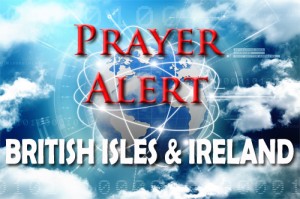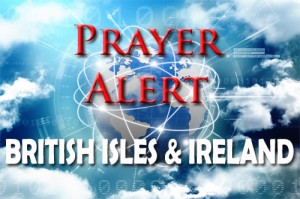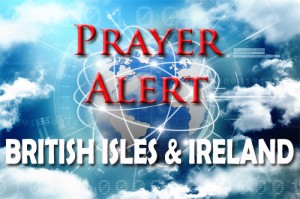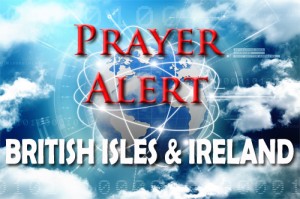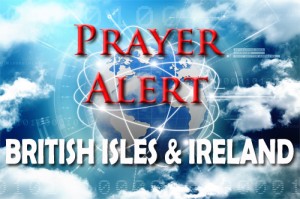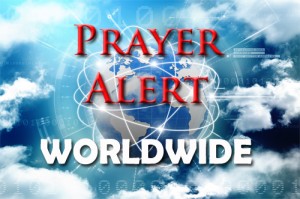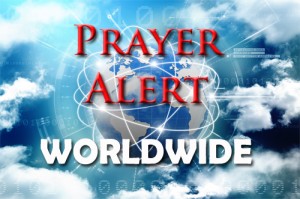
David Fletcher
David Fletcher is Prayer Alert’s Editor.
He is part of a voluntary team who research, proof-read and publish Prayer Alert each week.
If you would like to make a donation towards our running costs, please click here.
In March, Rev Malcolm Duncan spoke at the World Prayer Centre (WPC) WATCHING 2016 prayer conference. It was a time of envisioning, watching and hearing what the Lord is saying in these times: there were also four workshops to equip people in prayer, evangelism and the prophetic. Malcolm brought a significant prophetic word to Christians in these islands. It builds on words spoken by Smith Wigglesworth (1947) and Jean Darnell (1967) of God’s call on Great Britain. The WPC believe it is right to release this Word to the wider Church. You can download the transcript of Malcolm’s prophetic word at: Please study and pray about this word, asking God for wisdom, direction and guidance, asking, ‘Lord, how are You calling me to respond to this? Show me Your heart for my neighbourhood, town, workplace or community.’ You can listen to the podcast talk on being a watchman by clicking the ‘more’ button.
Students reading theology at Oxford University have overturned an 800-year-old tradition of studying Christianity throughout the course. Changes are being made to the undergraduate degree to ‘keep up with the changing face of Britain’. Students will have a broad choice of areas to study in their second and third year. One module is thought to be 'feminist approaches to religion and theology'. The move was instigated by students and lecturers challenging the lack of curriculum diversity, saying that the way religion is seen and practised in the UK had changed over recent years. Oxford University's theology faculty board chairman said, ‘The dominance of the Church of England has been receding, but religion hasn't disappeared. We want to offer students what is interesting for them.’
A national prayer call, promoted by Pray for Scotland (PfS) and Parliamentary Prayer Scotland (PPS), started on 27 March and will finish on 5 May, with a focus on Scotland’s elections. They are encouraging the Church in each city, town or rural community to come together in unity ‘As One!’ raising a shield of prayer over their area. This already happens in a few areas, but they believe God is calling the Church throughout the nation to do this on a regular, ongoing basis as part of His plans for changing Scotland’s spiritual atmosphere. Ask God to raise up leaders with integrity and wisdom who will act justly, care for the vulnerable, advocate for the weak, and work for the common good.
The ‘Panama Papers’, documents leaked to the investigative journalists, show that the British Virgin Islands is the most popular location for banks and law firms to facilitate corrupt and criminal business. The UK is second only to Hong Kong as the largest host of illicit trade. One aspect of financial secrecy that is overlooked is the impact on people in the poorest countries. A Christian Aid and Financial Transparency Coalition review of the leaks from the Swiss branch of HSBC showed that poorer countries lose far more to tax evasion than rich ones. Christian Aid said, ‘The Panama Papers have exploded any remaining excuses the UK had for allowing secrecy in its tax havens. This leak exposes the extent to which UK tax havens and UK-based intermediaries are at the very heart of this rotten system.’ See also article 1 in this week’s World section.
Last October Channel 4 aired a documentary on ‘The Secret Life of Four Year Olds’; four is the age most crucial in a child’s development as they cross the threshold from family life into school. The tools of social interaction the children learn at this stage lay the foundations for relationships they will form across their adult lives. Dr Elizabeth Kilbey took part in the programme and recognises the need for the government to invest in better quality early learning. She is petitioning the government to ensure that there is an early years teacher in every nursery in England by 2020. Save the Children’s research has found that 1 in 5 children start primary school behind in basic language skills (1 in 3 of the poorest children). If a child starts school behind, they struggle to keep up and don’t achieve their potential. See also:
A British father was banned from taking his son to church after the boy's Muslim mother won a court order at Derby Crown Court preventing the boy from attending. The father, a non-practising Muslim, has close connections to his local Christian community. He is divorced from the boy's mother and was warned he could be denied access to the nine-year-old if he takes him to church or a Christian leisure centre. The father, born in England to Pakistani parents, has lodged an appeal with the High Court to have this order overturned. 'This judge is simply scared of being branded Islamophobic,' he said. 'I want my son to have a balanced life in which he is exposed to different faiths and can make up his own mind about religion.’ The boy sees his father every other weekend. The order also decrees that he must provide only Halal food.
Parliament’s Foreign Affairs Committee (FAC) will monitor the case of a British father held in Ethiopia, among other cases, amid concerns that the government has lessened its commitment to ending human rights abuses abroad. The FAC said that there was ‘plainly a perception’ that the government had recently downgraded its commitment to the promotion of human rights, following news last August that the Foreign Office would no longer use the longstanding designation ‘countries of concern’ to denote countries associated with human rights abuses. Later an FCO official said that human rights were ‘not one of our top priorities’. Now the FAC will monitor the situation of several individuals facing abuses abroad, including Andy Tsege, a British father of three who was kidnapped at an airport in 2014 and taken to Ethiopia; he is being held under sentence of death.
The biggest data leak in history, detailing the activities of 200,000+ offshore companies, charts an escalating transfer of wealth by the offshore system from the poorest to the richest nations. Money that funds superyachts, private jets, fine art auctions, and property causes unseen damage to the economy of vibrant cities by making them unaffordable to ordinary people. Cash is also injected into London hedge funds and Wall Street trading rooms, funding high-stake investments and big bonuses. The data reveal a huge breadth of unseen activity that provides advantages only to the wealthy; such as Russian banks’ slush funds for President Putin’s inner circle, assets belonging to twelve country leaders, and companies connected to more than 140 senior politicians and their friends and relatives. All this is claimed to be subject to sanctions for supporting regimes in North Korea, Syria, Russia and Zimbabwe and the proceeds of crimes. See also this week’s article in British Isles section.
Brigadier General Tal Kalman, chief of staff of the Israeli air force, warned that weapons flowing into the region could shift the balance of power away from Israel, hinting at growing Iranian hegemony without naming the country. He said the air force was the ‘dominant and central figure’ in the successful defence of Israel against the threats facing it, but warned it could change. ‘Advanced Western and Eastern weapons have entered the equation and have been received by the countries surrounding us,’ he said, referring to military equipment coming from Europe and the United States, as well as from China, including fighter planes, ballistic missiles, and advanced surface-to-air missiles. An arms race, along with instability, creates a great danger. Despite Russia’s nominal withdrawal from Syria, the more advanced S-400 air defence system, along with other pieces of Russian military equipment, remain in the war-torn country, according to Russian media.
One in four people remain without reasonable access to the gospel. Although there may be a few believers or even a few churches, there are many people groups with no or few resources to evangelise their communities. What can we do to change this? Jesus told His disciples in Luke 10:1-3, ‘The harvest is plentiful, but the workers are few. Ask the Lord of the harvest, therefore, to send out workers into his harvest field.’ Jesus’ solution to the dilemma of the plentiful harvest with few workers was prayer. Prayer changes things! We can pray for the hearts among every least-reached people group to be ready to hear and respond to the Gospel; for the Lord of the Harvest to send labourers among these peoples;and for the Body of Christ to labour together in the unity of the Spirit to bring good news where it has never been heard before.

